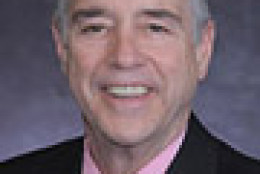American University
-
Everybody wants accountability from someone else. Congress wants it from federal agencies. Federal managers wants it from employees and vice versa. The public wants it from everybody. But demanding accountability means you've got to equip people with the skills they need to do the job. Could it be a lack of management training is causing federal employee engagement scores to fall for the last five years? Bob Tobias, professor in the Key Executive Leadership Program at American University, has some ideas, which he shares with Federal Drive with Tom Temin.
January 29, 2016 -
The Congressional Budget Office has found, the Defense Department could save billions by replacing uniformed people with civilian or contractors in certain non-combat, support jobs. But should it? Nora Bensahel, a military analyst and scholar in residence at American University, shared her analysis of the CBO report on Federal Drive with Tom Temin.
December 09, 2015 -
The last barrier for women in the military has been removed. Defense Secretary Ash Carter said women in any of the armed services could soon serve in any of the combat responsibilities. The move raises a lot of questions. How will it affect readiness? Combat effectiveness? Logistics? For some possible scenarios, Federal Drive with Tom Temin turned to retired Army Lt. General David Barno, now a scholar-in-resident at American University.
December 07, 2015 -
The good news in the 2015 Federal Employee Viewpoint Survey is that the two most important scores are up 1 percent each over last year. The bad news is last year was the worst year ever in the survey. Bob Tobias , director of Business Development at American University, takes a deeper look at the survey numbers on In Depth with Francis Rose.
October 02, 2015 -
HealthCare.gov, the Department of Veterans Affairs, the Secret Service and the OPM data breaches are what stand out in most people's minds about government operations in the Obama administration. He has 17 months left to leave the government in a better place and prepare it for a smooth transition. Bob Tobias is director of business development for Key Executive Leadership Programs at American University.
September 04, 2015 -
The company that pioneered the annual performance evaluation is trading its own concept for a different kind of review. General Electric is using a performance development app. Bob Tobias, a professor at the Key Executive Leadership Program at American University, tells In Depth with Francis Rose why this approach might not work well in the public sector.
August 17, 2015 -
If progress stalls against the Islamic State terrorist group, the U.S. military should start embedding troops with forces battling the Islamic State militants in Iraq. That's according to Army Chief of Staff Gen. Ray Odierno, who's retiring this month after a 39-year Army career. But what's the feasibility of Odierno's recommendation, and would it even work? Retired Lt. Gen. Dave Barno is a former senior American commander of U.S. and coalition forces in Afghanistan and now a distinguished practitioner-in-residence at American University. He joined Tom Temin on the Federal Drive to analyze the plan.
August 17, 2015 -
The White House has vowed to destroy ISIS. Defense Secretary Ash Carter echoed that vow and recently unveiled a new military strategy designed to do just that. Carter testified before the House Armed Services Committee, and said U.S. forces will not let up until they've eliminated the terrorist army. Retired Lt. Gen. Dave Barno is a distinguished practitioner-in-residence at American University. He joined the Federal Drive with Tom Temin to assess Carter's strategy.
July 09, 2015 -
Shutdown talk is coming back to Congress -- at least from some leaders like Senate Minority Leader Harry Reid (D-Nev.). The reason though is rather arcane. It\'s really about when another budget deal is made to avoid sequestration. Bob Tobias is a professor of Key Executive Leadership Programs at American University. He tells In Depth with Francis Rose what he\'s hearing from federal managers and workers about a rumored shutdown.
June 22, 2015 -
The amount of federal employees under the age 30 is in decline. In 2014 the amount of millennials in the overall workforce hit an eight-year low at 7 percent. Bob Tobias is professor of Key Executive Leadership Programs at American University. On In Depth with Francis Rose, he said the reason why young people are leaving the federal government may have something to do with organizational values.
March 30, 2015 -
The Senate Budget Committee's markup of its FY 2016 budget resolution is under way on Capitol Hill. Committee Chairman Mike Enzi's (R-Wyo.) plan is a lot different than the one the Chairman of the House Budget Committee, Rep. Tom Price (R-Ga.), rolled out yesterday. Gordon Adams is a professor at American University and former OMB official responsible for national security budgets. On In Depth with Francis Rose, he said the House's plan to boost the Overseas Contingency Operations budget to reach the level of spending the Obama administration wants for the Pentagon is a gimmick.
March 18, 2015 -
Bob Tobias, director of business development in the Key Executive Leadership Programs at American University, counts down the week's top federal stories with Francis Rose.
March 06, 2015 -
Congress has three main responsibilities as Board of Directors for the Executive Branch. It has to set lines of business for Congress, create agency programs, and evaluate agency performance. All of those responsibilities imply Congress should try to solve agency problems before they occur. Bob Tobias is professor of Key Executive Leadership Programs, American University, and former member of the Internal Revenue Service Oversight Board. On In Depth with Francis Rose, he told Federal News Radio's Jared Serbu Congress isn't proactive enough regarding the well being of your agency.
March 02, 2015 -
President Barack Obama has petitioned Congress for new authority to conduct military force against Islamic State militants. He's asking for a three-year authorization to fight them, or their successors, without regard for international borders. Nora Bensahel, a national defense expert and distinguished scholar-in-residence at American University, joined Tom Temin on the Federal Drive to further analyze the President's request.
February 17, 2015 -
Defense spending would get a 7.7 percent boost in 2016 under President Obama's proposed budget. Officials say the department is still feeling the disruption of reduced spending and sequestration cuts from recent years. The 2016 proposal includes funding for a broad range of weapons systems, missile defense and a 1.3 percent raise for service members and department civilians. Lt. Gen. Dave Barno (Ret.) was a senior American commander of U.S. and coalition forces in Afghanistan, and is now with American University. He joined Tom Temin on the Federal Drive with more analysis.
February 03, 2015








